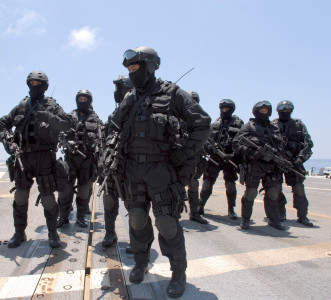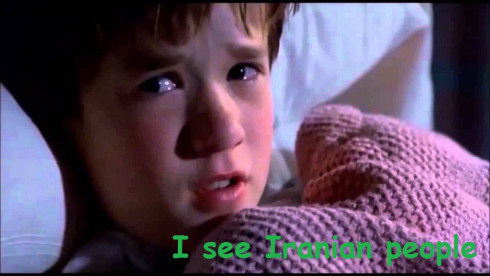The Guardian online contains a feature article on Iran’s role in Syria, written by their accomplished Middle East Editor Ian Black. Having heard Ian Black speak in person, and given that he has been with the paper for more than a quarter of a century, this reader was expecting an interesting, factual, and objective article. Or perhaps hope is a better word, given the amazing propensity for the UK media to blindly follow their Government’s agenda whilst covering foreign news stories. However, this hope did not last past the headline, such is the bias and lack of professionalism demonstrated in this and nearly all articles about Russia and Iran in the UK mainstream press:
How Iran’s shadowy role in Syria fuels paranoia and wariness
`Tehran has few boots on the ground but it nevertheless plays a critical role that unnerves its allies in the Assad regime as much as its enemies’
Just consider the description of Iran’s actions in the headline: shadowy conduct which creates `paranoia and wariness’; and not in the journalists mind, no rather in the mind of the Assad Government. This is quite a claim given that Iran has supported Assad whilst the Western powers have, at the very least, failed to make any significant contribution towards restoring peace in Syria. What then are these shadowy actions that create so much fear in their ally? Let us dissect this investigative report and determine if these claims are justified or whether this is yet another example of bias and unsubstantiated reporting made by a highly-regarded and well-read paper in UK. First let us turn our attention to the picture accompanying the article:
These must be the shadowy Iranian forces that so unnerve their allies, given the headline. No, they are in fact Iraqi volunteers in Damascus, young men who are no doubt dedicated and ready to fight for their cause, but they are not Iranian so why they are featured alongside the article is open to interpretation. The picture shown above this one is of Iranian special forces so one can only assume that Ian was not able to find them and elected instead to picture Iraqi Shia. Same religion, but from a different country. Not exactly an auspicious start from a Middle East Editor.
Next Ian describes the Iranian embassy in Damascus and quotes the Iranian ambassador Mohammed Reza Shaybani: “We have to respect Syria’s national sovereignty and territorial integrity…Iran does not interfere in Syrian domestic affairs. Our relations are historical and strategic. Our role is limited to consultation with the Syrian government for the sake of combating terrorism.” So this directly contradicts Ian’s own claims and goes against the entire premise of the article. Perhaps the Ambassador will let something slip, as he continues: “We provide advice to the Syrian government and the Syrian army,” he says. “It is natural that that requires us to see reality on the ground. The military advisers need to have a clear understanding of the situation on the battlefield. That does not mean that we have a lot of troops in Syria; we do not have a direct role in the fighting.”
Has Ian uncovered facts which discredit this statement, has he achieved something of a journalistic coup? Let us consider the next phase of the article and to do so we must first analyse this phrase:
`According to open-source data collected from Persian-language accounts of funerals in Iran…’
What does this statement actually mean, what are `accounts of funerals’? Have the intelligence services in US read every mention of a funeral on social media in Iran and been able to deduce from this the number of deceased, which branch of the military they served with, and where they died? This is what Ian’s source, Washington Institute, seems to be claiming. However, they in turn do not give any further details to give their claim credibility.
Now let us turn our attention to Ian’s source, Washington Institute. Their mission statement is as follows: `The Washington Institute seeks to advance a balanced and realistic understanding of American interests in the Middle East and to promote the policies that secure them.’ Some quick research on this think-tank has alarm bells ringing: `The organization has strong ties to the pro-Israel lobbying group AIPAC and was founded by former AIPAC employee’ (Who funds Muslim-baiting in the US?). So when this think-tank produces such articles in connection with the Iran Nuclear Deal as `Iran Will Cheat. Then What?’ by Dennis Ross; as compared to such cheery, story-book titles about Israeli politics as`Netanyahu Goes to Washington’ by David Makovsky, it should not only be unsurprising but also help to clarify the fact that by premising his following statements on the unverified claims of this think-tank Ian Black not only undermines the credibility of this article and its conclusions, but also does serious damage to his reputation.
And here are his claims: `Hard facts are elusive, but most analysts agree that Iran’s direct military presence is indeed fairly modest. It is led by the elite Quds force of the Islamic revolutionary guards corps (IRGC) and thought to number in the hundreds.’ Ian Black, who are these analysts, and if the hard facts are so elusive that you have not found them, just like the Russian forces in Ukraine, then why are you making these claims in their absence? But it gets worse. What followers is the journalistic equivalent of drunken gossip: `IRGC advisers, who are occasionally spotted near the frontlines, shun publicity. Fit-looking Iranians in civilian clothes are sometimes seen crossing the Lebanese border, handing over their passports en masse without being required to leave their vehicles – a sure sign of their discreet VIP status.’ One can only hope that Ian was somewhat pale and sheepish as he handed in this litany of he-said-she-said-someone saw-someone saying-nonsense. Who spotted the advisors? Should Iranians be overweight so as not to be confused with armed forces? Should they go for a quick jog around the check point perhaps so as not to be considered as having `discreet VIP status’? Ian is now not only an expert on the Middle East but also a student of Iranian health and simultaneously Lebanese border controls. Amazing industriousness on his part at least.
Next an unidentified businessman, perhaps a friend of Ian’s, enlightens us:
`The Iranians are there – and they are not there,’ quips a Sunni businessman from Homs. `They are a ghostly presence.’ Speculation about their activities is rife. But the consensus among many Syrians and foreign experts is that their role is extremely important – though very shadowy.
This consensus and agreement seems to have been reached not only in our absence but also whilst Ian was busy studying the behaviours of Iranians and Lebanese border guards. But wait, he has a named source: Emile Hokayem of the International Institute for Strategic Studies (IISS). Not to spend too much time think-tank bashing but suffice perhaps to say that this think-tank is a private limited company that supported the Iraq War (not to be confused with the Gulf War, this is the one in which UK Intelligence lied about the threat of WMD and most Britons steadfastly did not believe them nor support the war). In the final assessment it does not really matter how credible or otherwise this think-tank is as Emile recounts a tale similar to that found in the film `Sixth Sense’. He tells us: `We know quite a lot about what the Iranians do in specific places – we see weapons, equipment and intercepts – but we still don’t have an understanding of what they do in institutional terms.’ Basically he sees Iranian people in different places but cannot tell us about it. We should be appreciative and hope that he is adequately rewarded by the company he works for. Sorry, think-tank.
It goes on in this fashion, and on and on. Ian tells us that Iran provides economic support to Syria but fails to tell us how exactly, which is surely the point of journalism. Then he cites a source commonly cited on the play-ground, the rumour mill: `The Damascus rumour mill suggests some senior Syrian officials are unhappy with the Iranian role – but that their dependence on Tehran means they have to grin and bear it.’ Do not forget that this is the premise of the entire article: that the Syrians are paranoid and wary about Iran’s role in Syria. If Ian had mentioned this in the title then perhaps he could have saved his readership time analysing his hack journalism:
How Iran’s shadowy role in Syria fuels paranoia and wariness; according to Damascus rumour mill’
Next, and for a bit of variety perhaps, he decides to insult Iranians more generally: `Russians are more comfortable allies for a relentlessly secular regime – their vodka toasts easier to stomach than the dour religiosity of the Iranians, laughs a well-connected foreign observer.’ So Iranians are shadowy, imbue even their friends with paranoia and wariness, and now they are also dour due to their relgiosity. Has he ever dined with Iranians, and if so how could he make such a claim? No doubt next time he wants to draw a comparison between the lot of secular, expatriate Iranians in US or UK and that of poor Iranians left in Iran, he will no doubt use this line whilst conversely telling us how full of joy and laughter the expatriates are. Great journalism and understanding of cultures Ian, please keep the enlightened comments coming. Indeed he does, next denying the Russians any achievement in fighting terrorists on the basis of trying to save lives or a moral platform, but rather: `And on one view, Moscow’s increasingly active role reflects in part its own unease at Tehran’s growing influence in Syria and an effort to obtain greater leverage over Assad.’ Nice.
There follows yet more unconfirmed reports and opinionated comments about supposed Iranian actions in Syria: `[Iran] either negotiates on behalf of or ignores Assad and his inner circle, securing its interests directly rather than by proxy.’ Well if you say so, Atlantic Council think-tank. `Unconfirmed reports – emanating from unidentified Israeli security officials – say that the Iranians have committed “hundreds” of IRGC personnel to the battle for Zabadani’. Well if you say so, unconfirmed reports from unidentified Israelis. Now back to the man in the street, or gossip as it is commonly known: `Ordinary Syrians fret about wider Iranian influence: Damascenes gossip about land confiscated in Mezze to build a big Iranian housing project as well as a new embassy closer to the city centre; about Iranians buying up prime real estate, often anonymously’. They also see Iranians, this time buying places; but Ian interestingly takes the middle ground in this imagined situation. He is not after all, open to exaggeration but rather he deals only with imaginary facts from imaginary people concerning imaginary situations:
“Syria has been sold to the Iranians,” complains a resident of one of the capital’s better neighbourhoods. “They control everything.” Prejudice and paranoia make for a toxic argument that is promoted energetically by the Syrian opposition. Some even describe Syria as “Iranian-occupied” – a wild exaggeration.’
That Ian points to prejudice and paranoia in connection with a toxic arguement is a very positive development but it is somewhat distressing that he cannot see the wood for the trees, and he cannot see that it is not the Iranians that are creating paranoia or wariness but rather the reader is rightly wary of his paranoia, which appears to be shared by various think-tanks, as recorded in this article.
Following this a couple of journalists expound on their ideas of what Iran may or not be doing with regard to Syria, in the most general terms and without proof or examples to the extent that it is not even worth mentioning here, although Ian affords it a couple of paragraphs.
Mercifully the final word goes to the pragmatic and lucid Iranian Ambassador: “Bashar al-Assad is the choice of the Syrian people and it is up to them to elect who they wish. No one has the right to say that he must leave: the Libyan experience shows what happens after the volcano that erupted when Gaddafi was removed. In the current situation there can be no replacement until terrorism has been defeated in Syria.”
Does it Matter?
Having dissected this article and exposed the false premises and the unverified sources, including random people on the street; the clear bias and unsubstantiated claims regarding the actions of Iran (not, it should give us pause for thought, a celebrity from a reality show) as expounded by the regional editor of one of the most highly regarded newspapers in UK if not the world, we given cause for grave concern. According to studies by the American Press Institute, as reported in Washington Post, `roughly six in ten people acknowledge that they have done nothing more than read news headlines in the past week.’ Given that this article is a featured article with a large accompanying picture online, it is more than likely that most people will read the headline and consign this `news’ to the `Iran causing trouble’ part of their memory store. So it does matter and it is consequential when the Middle East Editor of The Guardian basically lies about the actions of Iran and the perception of these supposed actions by Syrians, and in doing so flagrantly violates his own codes of practice. The gist of the message is that the UK press are willing to denegrate entire countries on the basis of their leaders foreign policy. Unfortunately this is part of a greater move towards polarisation whereby people either dismiss Iran and Russia out of hand and see them as dangerous dictatorships based on their portrayal by the mainstream media in UK, or they turn away from such traditional sources of news and towards alternative sources such as Southfront. Trust is vital to journalists, and here is why: this article is simply a brief deconstruction of one Guardian article and it consists of nearly 2,500 words. Is it feasible to read an article about Russia or Iran and then conceptualise such a polemic, every time? Ofcourse not, so why waste your time. Better to read Southfront and spend your free time exercising, if only to confuse Guardian journalists. (Written by Nenada)






